CEFDINIR SUSPENSION - ORAL
PHONETIC PRONUNCIATION: (SEFF-dih-neer)
COMMON BRAND NAME(S): Omnicef
GENERIC NAME(S): cefdinir
Uses
USES: Cefdinir is used to treat a wide variety of bacterial infections. This medication is known as a cephalosporin antibiotic. It works by stopping the growth of bacteria. This antibiotic treats only bacterial infections. It will not work for viral infections (such as common cold, flu). Using any antibiotic when it is not needed can cause it to not work for future infections.
How to use CEFDINIR SUSPENSION - ORAL
HOW TO USE: Take this medication by mouth with or without food as directed by your doctor, usually once a day or twice a day (every 12 hours). Shake the bottle well before each dose. The dosage is based on your medical condition and response to treatment. In children, the dose is also based on weight. For the best effect, take this antibiotic at evenly spaced times. To help you remember, take this medication at the same time(s) every day. Continue to use this medication until the full prescribed amount is finished even if symptoms disappear after a few days. Stopping the medication too early may allow bacteria to continue to grow, which may result in a relapse of the infection. Some medications can bind with cefdinir preventing its full absorption. If you take antacids containing magnesium or aluminum, iron supplements, or vitamin/mineral products, take them at least 2 hours apart from cefdinir. However, iron-fortified infant formulas do not bind with cefdinir and can be given at the same time. Inform your doctor if your condition persists or worsens.
Side Effects
Precautions
Interactions
Overdose
Images
Reviews
Faq for CEFDINIR SUSPENSION - ORAL
- Cefdinir suspension is an antibiotic medication used to treat various bacterial infections, including respiratory tract infections, skin infections, and certain types of ear infections.
- Cefdinir suspension should be taken exactly as prescribed by your doctor. Shake the bottle well before each dose and measure the correct amount using the provided measuring spoon or syringe. It can be taken with or without food, usually once or twice a day. Complete the full course of treatment even if you start feeling better.
- Common side effects of cefdinir suspension may include diarrhea, nausea, vomiting, headache, and vaginal yeast infection. If you experience severe or persistent side effects, inform your doctor right away.
- Yes, Cefdinir suspension can be given to children. The dosage will depend on their age and weight. It is important to follow your pediatrician's instructions and use the proper measuring device to ensure the correct dosage is administered.
- Cefdinir suspension may interact with certain medications, such as antacids containing aluminum or magnesium, iron supplements, and probiotics. Inform your doctor or pharmacist about all the medications you are currently taking to avoid any potential interactions.
- It is generally recommended to avoid alcohol while taking Cefdinir suspension as it may increase the risk of side effects and decrease the effectiveness of the antibiotic.
- Cefdinir suspension usually starts working within a few days. However, it is important to complete the full course of treatment, even if you start feeling better, to ensure complete eradication of the infection.
- Cefdinir suspension should be stored at room temperature, away from moisture and heat. Do not freeze it. Keep the bottle tightly closed when not in use. Check the expiration date and discard any expired medication.
- If you miss a dose, take it as soon as you remember. However, if it is close to the time for your next dose, skip the missed dose and resume your regular dosing schedule. Do not double the dose to make up for a missed one.
Disclaimer
IMPORTANT: HOW TO USE THIS INFORMATION: This is a summary and does NOT have all possible information about this product. This information does not assure that this product is safe, effective, or appropriate for you. This information is not individual medical advice and does not substitute for the advice of your health care professional. Always ask your health care professional for complete information about this product and your specific health needs.
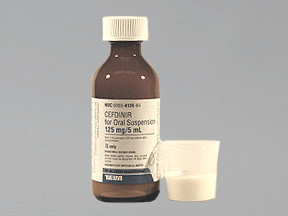
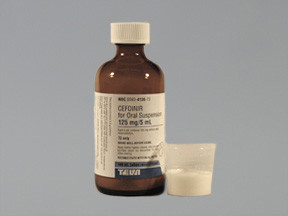
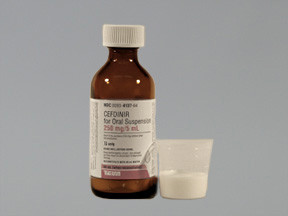
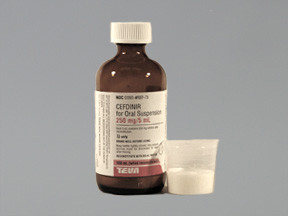
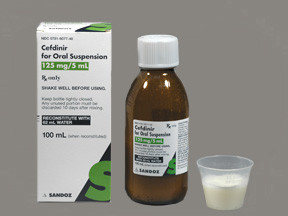
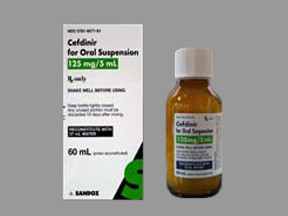
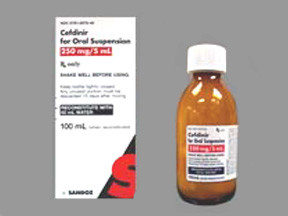
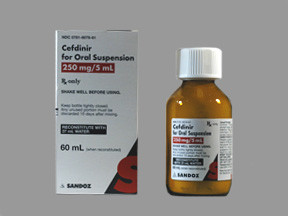

No Reviews Yet